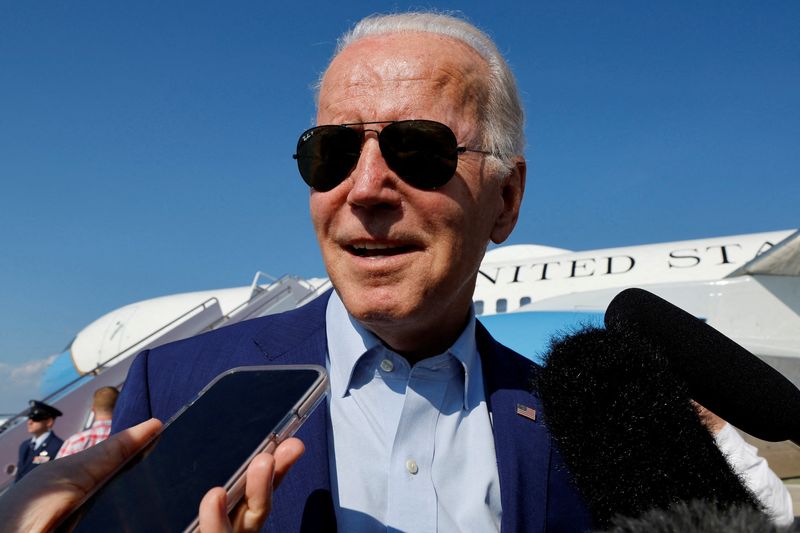PUCKETT: Biden’s Disastrous Agenda Is The Real Emergency, Not The Climate
Jakob Puckett on July 27, 2022
President Joe Biden may jump the (climate change-displaced) shark soon by formally declaring a “climate emergency” to advance energy policy goals. While it’s not yet official, his consideration of doing so, and the urging of prominent legislators, is cause for concern.
Emergency powers are designed for events like terrorist attacks, epidemics and natural disasters. They aren’t intended to address persistent problems, even those as constant as the Biden administration’s inability to get major energy legislation through Congress.
The reason for the president’s impatience is obvious: Sen. Joe Manchin sank his Build Back Better energy policies — again. Manchin wants inflation to fall before renewable energy subsidies rise.
That may be frustrating for Biden, but it’s no reason to declare an emergency — that is, unless you’re declaring one over the state of the Democratic Party.
Declaring a climate emergency to unlock typically off-limits executive power would be extreme, but it would simply be the latest iteration of the Biden administration’s increasingly misguided clean energy policies.
The administration’s recent invoking of wartime powers in the Defense Production Act (DPA) to subsidize production of materials needed for clean energy technologies is another example of the administration putting the cart before the horse. Bizarrely, the administration is using the DPA to subsidize products that the same administration is regulating into scarcity.
Similarly, many of the administration’s proposed energy policies miss the forest for the trees. As was known last year when Congress was debating the Build Back Better plan’s energy policies, the president’s proposal would act more as a handout to monopolized utilities than clear the path for increased clean energy development.
Entrenching monopoly power by handing them the money and the means to erect barriers to competition from competitive clean energy suppliers, to crowd out distributed generation resources, and to stifle customers’ adoption of their own clean energy technology is a backwards way to advance the future of the energy industry.
Moreover, overgrown regulation — not federal spending — is often the biggest obstacle to getting more clean energy on the grid. For instance, environmental reviews under the National Environmental Policy Act are now hindering twice as many clean energy projects as fossil fuel projects.
Additionally, electric transmission line capacity needs to be expanded to incorporate more clean energy, either through increasing the carrying power of existing lines or building new ones, but slow-moving regulatory reform makes it challenging. Scaling up nuclear and hydropower holds great promise, but outdated licensing procedures add several years and millions of dollars to the process.
Regulations making it harder to build new projects and squeeze the most out of competition litter the road to increased clean energy development. Removing bureaucratic obstacles is infinitely cheaper than reaching into taxpayer pockets for subsidies and more lasting than grabbing for executing power that floats with the political winds.
If the Biden administration wants to walk the emergency declaration walk, using the same amount of zeal to support market based regulatory and legislative reforms can help. There is no shortage of private capital seeking environmentally sound investments, and the administration should promptly recognize that the private sector is better equipped to innovate and the market is more suited to weigh costs and benefits of emerging technologies than the executive branch.
Moreover, increased attention to scaling up America’s most reliable clean energy sources — nuclear and hydro power — can provide large benefits. With many nuclear and hydro plants at risk of closing and taking large amounts of clean energy with them, keeping these power sources online is a vital step in any clean energy plan.
Meaningful reforms are often not flashy or celebrated, but they get the job done. Increasing clean energy production requires consistent policies and long term stability, which means bipartisan-supported regulatory reform and congressional legislation. Getting the process right is just as important as getting the results right.
If the Biden administration wants to make a real difference in supporting clean energy growth, they should build sturdy foundations before declaring that the sky is falling.
Jakob Puckett is an energy analyst and a Young Voices Contributor.
The views and opinions expressed in this commentary are those of the author and do not reflect the official position of the Daily Caller News Foundation.
Content created by The Daily Caller News Foundation is available without charge to any eligible news publisher that can provide a large audience. For licensing opportunities of our original content, please contact The Daily Caller News Foundation
Content created by The Daily Caller News Foundation is available without charge to any eligible news publisher that can provide a large audience. For licensing opportunities of our original content, please contact licensing@dailycallernewsfoundation.org. Read the full story at the Daily Caller News Foundation

